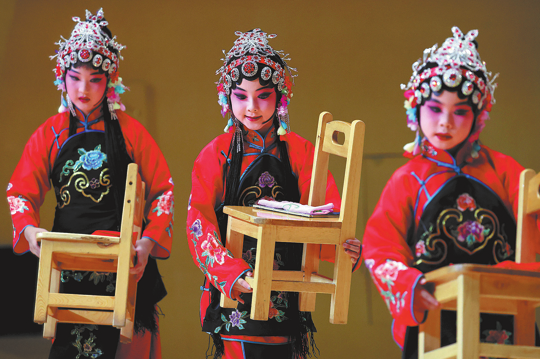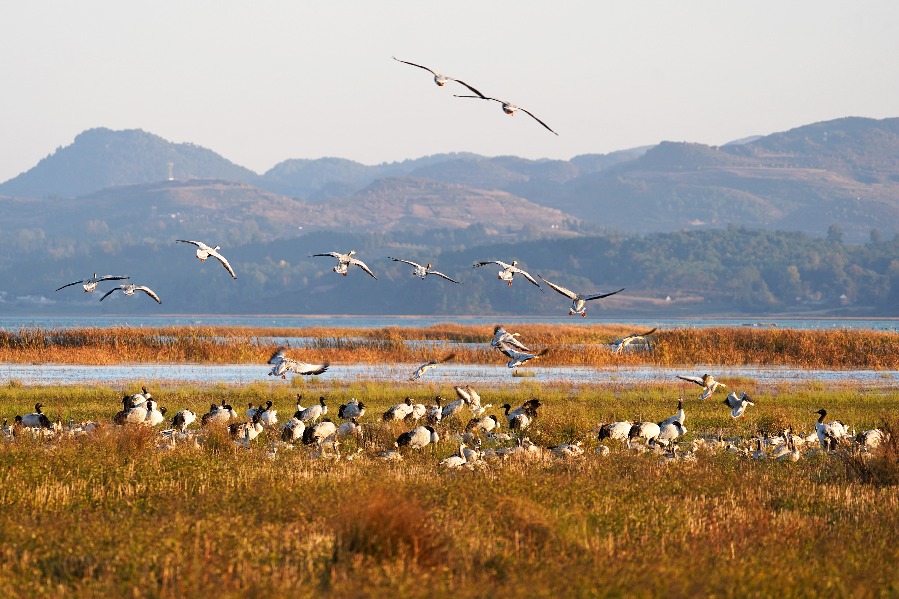Scientists ID genes foiling rice breeding


Discovery could spur super-high-yield crops, reduce reliance on food imports
Chinese crop scientists have pinpointed a pair of genes that have played an outsized role in impeding two distant relatives in the rice family from crossbreeding.
The discovery has laid the groundwork for creating next-generation, super-high-yield rice crops and has provided a boon to China's efforts to curb its reliance on food imports, experts said.
The finding, they added, also marks a major breakthrough in humanity's protracted struggle to overcome reproductive isolation, an evolutionary phenomenon that has hindered efforts to pool well-performing genes through hybridization.
Discoveries yielded during the 13 years of research, which was led by Wan Jianmin of the Chinese Academy of Agricultural Sciences, were published in an article on the website of scientific journal Cell late on Wednesday.
Researchers from the CAAS and Nanjing Agricultural University in Jiangsu province found that the two neighboring genes on the No 12 chromosome of rice dictate the fertility of hybrid rice pollen by affecting the energy-producing mitochondria in the cell.
A media release by the CAAS said the research was the first of its kind to explain rice hybrid sterility at the molecular level and described it as groundbreaking.
Wan, also a Chinese Academy of Engineering academician, said the discoveries can help fast-track the hybridizing effort targeting two rice varieties widely grown in the country: the less glutinous-tasting variety of hsien rice, and the keng rice strain, which is widely planted in colder provinces in the north.
"The end product is expected to raise rice output by 15 percent compared with the existing high-yield species," he told a news conference in Beijing held earlier on Wednesday to brief reporters about the major findings.
He estimated that with the aid of the latest findings, next-generation hybrid rice can be promoted on a large scale in about a decade.
Chong Kang, an academician of the Chinese Academy of Sciences and a top plant biologist, hailed the research as a milestone in crop breeding and said the findings will prove useful in the molecular design for super hybrid rice.
Earlier breeding efforts were mostly empirical, and in comparison, the most cutting-edge breeding technologies aim to "customize a molecule as if it were a manufactured product" to achieve the desired outcome.
China is a front-runner in hybrid rice breeding.
A breakthrough by late crop scientist Yuan Longping in the 1970s greatly boosted the yield of rice production in China and beyond, and earned him the title "father of hybrid rice".
Wan's research is part of broader efforts to hybridize more distant rice varieties to further bolster the yield of a food crop that is consumed as staple food by more than half of the world's population, as crossbreeding less-related varieties can normally produce higher-yielding offspring.
Wang Chaolong, a rice scientist involved in the research, said efforts to hybridize closer rice strains — such as the two substrains belonging to the hsien rice strain, which Yuan achieved — and to advance their yields have languished in recent years.
"In comparison, to hybridize the more distant hsien and keng rice varieties appears to be the most promising way to push up productivity in a short time frame," he said at the news conference.
The research has epitomized China's ramped-up efforts in recent years to bolster its food security through technologies.
At the annual Central Rural Work Conference in December, the central authorities elevated the importance of seed and breeding technology on a par with the traditionally important work of farmland preservation.
While addressing the news conference, Wu Kongming, president of the CAAS, said technologies are playing greater roles in farming, and expertise over genes are "chips in the agricultural field".
"We crop scientists must shoulder the responsibility to enhance independence in the area of agricultural technologies and set our sights on the frontier of the world's technological innovations," he said.
Customs data showed that China imported about 147 million metric tons of grain last year, accounting for 19 percent of its total food consumption that year.
Wang, the rice scientist, said China's food output must increase by 20 percent by 2030 to meet its rising food demand.
- China opens draft regulations on data protection to public consultation
- Veteran French physicist elected to Chinese Academy of Sciences
- Former Polish deputy PM praises China's economic rise, growing influence
- HK powers the nation's equestrian development
- Forum hailed for promoting Global South modernization
- Wushu needs more events in GBA, coaches in Macao say





































